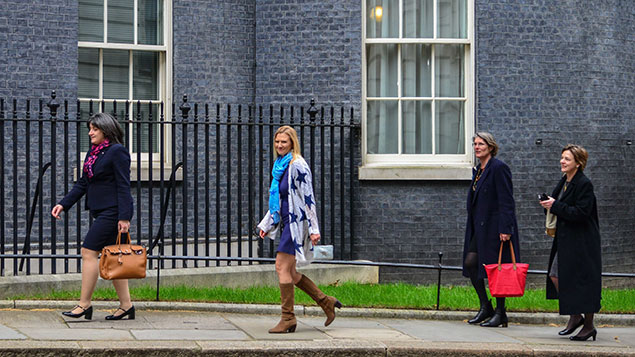

Entrepreneurs and leading business people arrive at Downing Street to an event hosted by the Prime Minister to mark International Women’s Day.
Photo: PA Images
Industrialised recruitment practices in the form of AI are a threat to developing the kind of diverse, agile and skilled workforce that is required in the 21st century, writes Dominie Moss. And increasing the proportion of women in the higher echelons of business is vital for progress
In the headlines this morning and earlier this week we have seen more stark reminders of the effects of the gender pay gap in our workplaces. A new study from the TUC coined last Wednesday Women’s Pay Day – signifying the end of the two months at the beginning of the year when women effectively work “for free”.
It is poignant that this lands just days before International Women’s Day, particularly one heralding the theme Balance for Better. Offices and social media will be abuzz today, rightly celebrating women around the world. But there is still work to be done to achieve this year’s theme of balance in our workplaces.
We all know that creating balance is a huge challenge for HR professionals and hiring managers. Linear recruitment practices, busy schedules and tight targets means that time and cost can often trump diversity when it comes to hiring decisions.
Embracing Balance for Better this year means we need to dissect these practices, rewire how we view the workplaces that we all inhabit and take a long-term view over a short-term one. Change will not happen overnight – it will take persistence, conviction and bold leadership to keep on course. True balance will come from everyone playing their part and believing they are part of the journey.
Facing the fear of profitability
We have all heard how inclusive workplaces are proven to be more successful, both in terms of productivity and reducing risk. However, the industrialisation of recruitment practices is failing to add the diversity to our workplaces that we so desperately need.
We know that artificial intelligence (AI) services can be useful for churning through those piles of CVs, but automated recruitment systems can actually make hiring diverse candidates, or those with atypical experience, that much harder, as algorithms are designed to mirror the current workforce.
We need to deconstruct the idea behind these algorithms that hiring diverse candidates is more risky than traditional hires. We need to align our incentives for diversity with the purpose of our hires.
Going back with laser focus on the skill sets we want from future employees could put us on track to achieving more balanced workplaces.
Being more open to those with diverse experience, or atypical CVs could also be part of this solution. Looking past the “round peg, round hole” mentality to recruitment could unlock new pools of talent that benefit businesses as a whole by tackling skills gaps, which will in turn champion diversity.
Championing change for all
Tackling the lack of women at the top of our workforces also has real benefits for corporate UK as a whole. The creation of diverse workplaces goes beyond gender to create a better balance for all.
While it does run the risk of becoming a catch-all phrase, reworking how we view flexibility is a good example of how we can re-programme our approach to HR.
We recently asked our candidates what they thought were the main barriers preventing women from returning to work and one in 10 said a lack of flexibility was a problem for them.
It is clear that flexible and agile working patterns are part of the solution. However, flexibility should not just be a perk for those with lengthy service time or seniority behind their names.
Around the country young people are joining our workplaces who are likely to be working well into their 70s, perhaps even beyond, and they will be thinking differently about flexibility. Embracing opportunities for both formal and informal flexibility is something that will affect the entire workforce. Workplace policies that take this seriously will have a beneficial trickle-down effect for everyone, irrespective of gender.
What is clear is that it is time to start considering the balance of our workplaces as a business problem, not only an issue for HR teams to grapple with. It is only then that we will start to see real change, and feel the benefits of balance in the workplace.
- The Return Hub has helped more than 1,000 women and relaunched many careers in the City. It has also campaigned to promote the benefits to employers of hiring from the hidden talent pool of women returners via its #TimeToReturn campaign.
